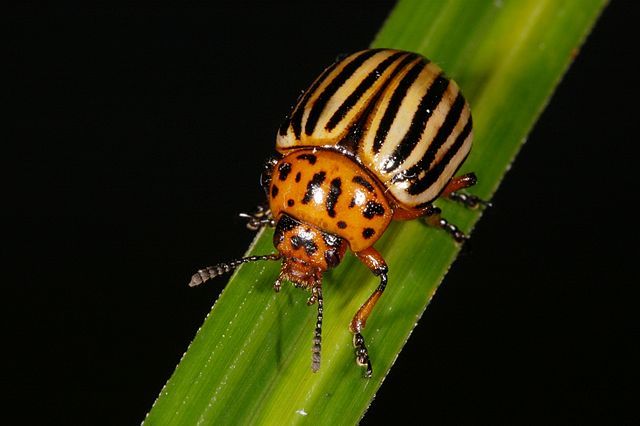Editor’s note: Joe Hanson is director of market development at GreenLight Biosciences in Medford, Massachusetts. GreenLight Sciences is a portfolio company of AgFunder, which is AFN‘s parent company.
Agricultural pests lead to more than $100 billion in annual global crop loss, according to the Pew Initiative on Food and Biotechnology. While traditional, chemical-based pesticides have been a mainstay in battling pests and maximizing yields for generations, farmers are looking for new solutions which are as effective as chemicals but with an improved environmental profile.
Precise targeting
New advancements in biocontrols based around ribonucleic acid (RNA) promise a safe and sustainable alternative to synthetic chemicals at industrial scales. While available RNA interference (RNAi) products are modified in the seed, new concepts take a spray approach. When applied as a foliar pesticide, RNAi-based biologics work by precisely targeting a specific pest or pathogen, without harming the field’s biodiversity.
More importantly to farmers, field trial data shows that foliar applied RNAi-based biopesticides can be as effective and economical as chemical pesticides, and reduce the need for workers to handle more toxic chemicals.
Here’s how: RNA is a natural molecule present in, and used by, all living things to carry out the instructions from their DNA. RNAi-based biologics use a naturally occurring process to ‘interfere’ with these instructions. By taking advantage of this process, we can silence a specific gene in the pest that is critical to its growth. The pest is eliminated, but the plant stays healthy and there’s no negative impact on the environment. Since the gene suppression is temporary, the effects are not passed down to subsequent generations. Therefore, pest control is accomplished without genetic modification to either the pest or the underlying crop.
RNAi gives farmers a new way to reduce their use of chemical pesticides, growing healthy crops sustainably in an environmentally friendly way. And consumers’ increasing demands for safer, toxin-free foods are met as well. Because RNAi-based biologics are completely carbon-based, they leave little to no residue in the soil, water, or the produce itself – nor do they contribute to global warming in a significant way, unlike petrochemical-based solutions.
Effective control of pests and disease at scale
RNAi control for agriculture isn’t a new idea; companies and labs have been experimenting with it for years. Traditionally, producing RNAi pesticides has been an extremely expensive and energy-intensive process, costing as much as $10,000 per gram.
The breakthrough that has made RNAi viable today is in cracking the code for rapid and affordable RNA production at the scale needed for commercial agriculture.. At GreenLight Biosciences, our cell-free bioprocessing systems can now produce quality RNA products at a fraction of the cost, and price-competitive with today’s chemical pesticides.
The Colorado potato beetle inspired a $102 million fundraise – and could yet inspire a Covid-19 vaccine. Read more here
Earlier approaches synthesized RNA using fermentation in vats of living microbes, which pose significant purity, cost, and energy challenges. New cell-free bioproduction approaches overcome these challenges by breaking down RNA from low-cost yeast and rebuilding it into targeted RNA enzymes. These enzymes don’t require energy to work; cells generate the necessary energy.
For example, one of the first uses of our next-generation RNA biologics is for the Colorado potato beetle, an invasive pest that destroys potatoes and other crops in the nightshade family. RNAi interrupts the beetle’s biological functions, killing it off and protecting potato plants.
What’s more is that these next-generation RNAi products are effective at much lower use rates, minimizing residue on the plant and exposure to soil and water. Products currently entering the market will likely have reduced chemical loads per acre.
Beyond agtech
As RNA plays an essential role in the genetic machinery of all living things, the potential for bio-targeted RNA extends well beyond agriculture.
Next-generation RNA technologies can also be used to accelerate discovery of vaccines and antibody therapies to address global health concerns, which is particularly critical in the wake of the global Covid-19 pandemic. In fact, companies like Moderna and GreenLight Biosciences are already working on developing new vaccine candidates.
In the case of RNA-based vaccines, the goal is to trick our own cells into producing a harmless viral component — for example, like the coronavirus’ spike protein — against which our body will mount a defense by generating specific antibodies. Therefore, once exposed to the actual virus, our body already has its immune response ready.
Unlike traditional vaccines that rely on weakened or dead forms of a pathogen to activate our immune system, this novel approach simply injects a ‘messenger RNA’ (mRNA) carrying the instructions to produce the viral antigen. Doing so allows for a more efficient vaccine and more rapid production.
But, as with RNA-based biopesticides, creating vaccines with RNA has been a slow process that is difficult to scale.
Until now, that is. New RNA platforms for life science companies offer the potential for rapid vaccine production coupled with scalable, high-fidelity manufacturing.
From sustainable food production to public health crises, RNA technology offers a new way to develop solutions that work with nature, not against it. Next-generation RNA-based products can be used to naturally and safely solve agricultural and healthcare problems, with the potential to impact an even broader range of industries in time.





